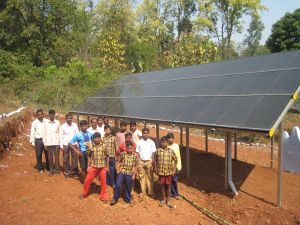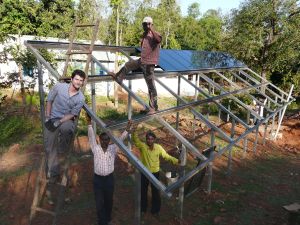Secure electricity supply was lacking in the training center “Silent Valley” in Gonasika. The university group Engineers without Borders (EWB) of Karlsruhe Institute of Technology (KIT) wanted to change this. Under the “India Electric” project, they built a photovoltaics station in the small village. Construction was completed in early April this year. First balancing shows that the plant provides for a reliable electricity supply. It is the long-term objective of EWB to extend electricity supply for the operation of computers and machines.
The “Silent Valley” center, where apprentices aged 12 to 16 are trained to become tailors or carpenters, is located in the village of Gonasika. It is situated in an impassible jungle area in the north of the Indian state of Orissa. Due to its remote location, the school is not connected to the public electricity grid. “After 8 p.m., light was provided by kerosene lamps. Inhabitants could not use computers and modern machines, which is a drawback for the training of carpenter and tailor apprentices,” says Tim Eck from Engineers without Borders (EWB), who studies business engineering.
“By constructing a solar power station, we wanted to provide for the basic electricity supply of the training center,” emphasized Kaili Shen, EWB chairman and student of electrical engineering. The “India Electric” project started in 2010 and was supported by foundations and the organization operating the training center. Technical components, such as panels and AC converters, were made available by industry. The EWB group constructed the plant and distribution station accommodating the batteries, charge control unit, and the converter, and installed the electric system. The students repeatedly travelled to India during their holidays in order to check local conditions, establish contacts to Indian logistics and battery companies, and to coordinate the project.

The completed photovoltaics station at Gonasika. (Photo: EWB)
Installation of the station was completed in early April, the first balance is positive: The lamps provide for reliable illumination. Days with little sunlight are compensated by a battery storage system which also guarantees consumption independent of electricity supply. “We trained supervisors, who are now operating the solar station and ensure that the system works,” says Shen. Now, the EWB members evaluate the technical data for a period of one year in order to check the efficiency of the plant and to optimize it, if necessary. In the long term, the center will be equipped with computers and machines.
The group will make available a detailed project description as an open source. “In this way, all those, who are interested in executing similar projects, may obtain a first idea of technical prerequisites and project execution,” says Eck. Apart from the solar project in India, EWB executes other projects to improve living conditions in developing countries. A cistern at a school in Port-au-Prince on Haiti, for instance, is aimed at improving drinking water supply in the long term. Dry toilets will prevent the drinking and usable waters from being contaminated at an orphanage in Golomolo, Uganda.
On Wednesday, June 20, the EWB group will present the “India Electric” project in a slide show (lecture hall 59, building 10.81, KIT Campus South) to the interested public. Further information on the program and short-term changes will be provided on the website of the university group at http://www.ewb-karlsruhe.de/.
Information on the “India Electric” project:
http://www.india-electric.ewb-karlsruhe.de/.
The KIT Climate and Environment Center develops strategies and technologies to secure the natural bases of life. For this purpose, 660 employees of 32 institutes produce fundamental and application-oriented knowledge relating to climate and environmental change. It is not only aimed at eliminating the causes of environmental problems, but increasingly at adapting to changed conditions.
Being “The Research University in the Helmholtz Association”, KIT creates and imparts knowledge for the society and the environment. It is the objective to make significant contributions to the global challenges in the fields of energy, mobility, and information. For this, about 10,000 employees cooperate in a broad range of disciplines in natural sciences, engineering sciences, economics, and the humanities and social sciences. KIT prepares its 22,800 students for responsible tasks in society, industry, and science by offering research-based study programs. Innovation efforts at KIT build a bridge between important scientific findings and their application for the benefit of society, economic prosperity, and the preservation of our natural basis of life. KIT is one of the German universities of excellence.

